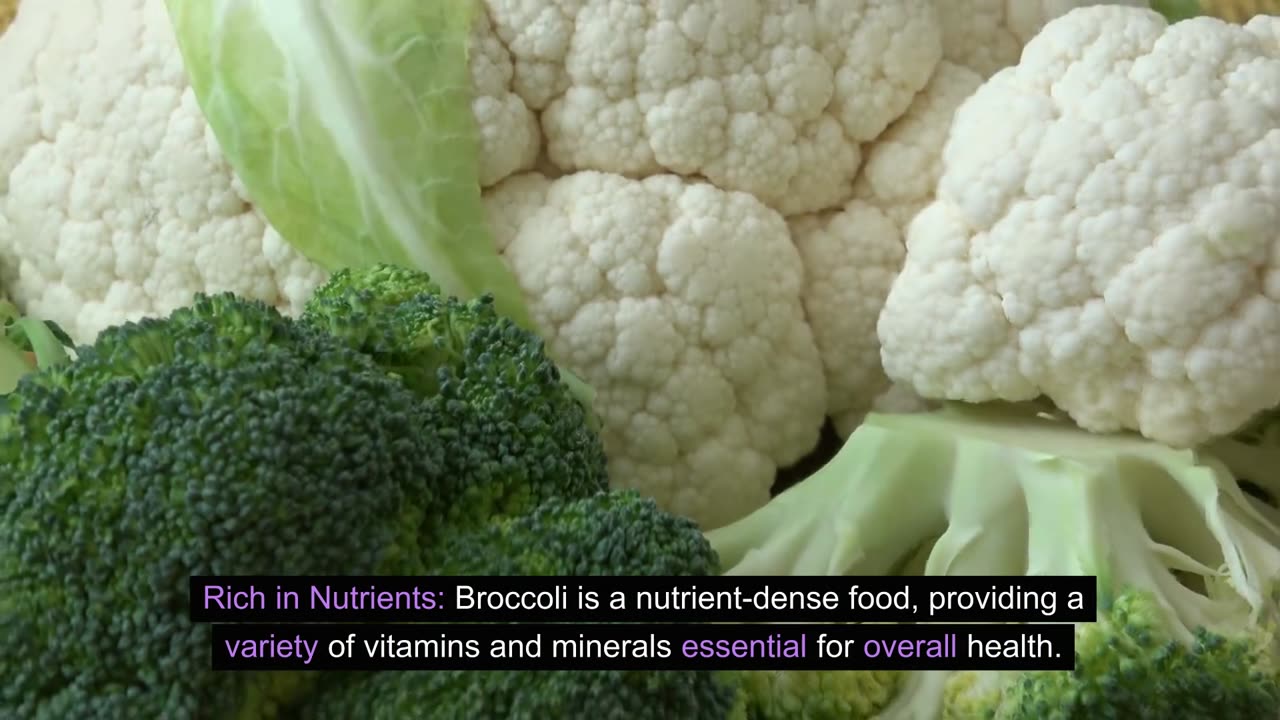Premium Only Content

Things you may not know about broccoli
Broccoli Ingredients:
Broccoli is a nutritious vegetable that belongs to the cruciferous family. It is rich in various vitamins, minerals, and other beneficial compounds. The main components of broccoli include:
Nutrients:
Vitamins: Broccoli is an excellent source of vitamin C, vitamin K, and vitamin A. It also contains small amounts of various B vitamins, including folate (B9).
Minerals: It provides minerals such as potassium, manganese, and phosphorus.
Fiber: Broccoli is high in dietary fiber, which is essential for digestive health.
Phytochemicals:
Glucosinolates: These sulfur-containing compounds are found in cruciferous vegetables and have been associated with potential health benefits.
Flavonoids and Carotenoids: Broccoli contains various antioxidants like kaempferol, quercetin, and beta-carotene, which contribute to its health-promoting properties.
Protein:
While not as high in protein as some other foods, broccoli does contain a small amount of protein.
Health Pros:
Rich in Nutrients: Broccoli is a nutrient-dense food, providing a variety of vitamins and minerals essential for overall health.
Antioxidant Properties: The antioxidants in broccoli, such as vitamin C and various phytochemicals, help combat oxidative stress and inflammation.
Cancer Prevention: Some studies suggest that the compounds in broccoli, particularly glucosinolates, may have anti-cancer properties and could potentially help reduce the risk of certain cancers.
Heart Health: The fiber, potassium, and antioxidants in broccoli contribute to heart health by helping to lower blood pressure, reduce cholesterol levels, and improve overall cardiovascular function.
Digestive Health: The fiber content in broccoli promotes a healthy digestive system by supporting regular bowel movements and preventing constipation.
Cons:
Gas and Bloating: Broccoli contains fibers that can cause gas and bloating in some individuals. Cooking methods like steaming may help reduce these effects.
Goitrogens: Broccoli contains compounds known as goitrogens, which may interfere with thyroid function. However, the levels in broccoli are not typically high enough to cause problems for most people, especially if it's consumed as part of a balanced diet.
Potential Allergies: While rare, some people may be allergic to certain components in broccoli. Symptoms can include itching, swelling, or difficulty breathing.
Oxalates: Broccoli contains oxalates, which can contribute to the formation of kidney stones in susceptible individuals. However, the oxalate content in broccoli is generally lower compared to some other foods.
Facts:
Origin: Broccoli is believed to have originated in Italy and has been cultivated for over 2,000 years.
Varieties: There are different varieties of broccoli, including the familiar green broccoli, purple broccoli, and broccolini.
Versatility: Broccoli can be eaten raw or cooked. Common cooking methods include steaming, boiling, roasting, and stir-frying.
Low in Calories: Broccoli is a low-calorie food, making it a great choice for those looking to manage their weight while still obtaining essential nutrients.
Culinary Uses: Broccoli is a versatile vegetable used in various dishes such as salads, stir-fries, casseroles, and soups.
-
 22:37
22:37
Nick Shirley
11 hours agoInside the Trump White House in 2025
5298 -
 1:34:23
1:34:23
The Confessionals
17 hours agoAre You God’s Weapon Against the Nephilim?
1.07K4 -
 10:50
10:50
SKAP ATTACK
17 hours ago $0.04 earnedNico Harrison is a Disgrace
6515 -
 18:13
18:13
Bearing
15 hours agoMy Girlfriend is a DOG 🐶🦴😳
3.19K28 -
 25:56
25:56
This Bahamian Gyal
11 hours agoBOTCHED: The WORST Plastic Surgeries Ever! | This Bahamian Gyal
9353 -
 37:25
37:25
Uncommon Sense In Current Times
14 hours agoFaith-Based Films Are Rising—And Hollywood Can’t Ignore It | Greg Rabidoux
5.39K -
 11:14
11:14
unclemattscookerylessons
21 hours ago $0.01 earnedRoast beef and yorkshire pudding
1.25K6 -
 2:46:10
2:46:10
TimcastIRL
9 hours agoTim Pool & Crew CRASH White House Press Briefing And Liberal Media IS PISSED | Timcast IRL
234K155 -
 2:49:19
2:49:19
Laura Loomer
9 hours agoEP116: COUP DE SANTIS: FL Legislators Investigate Ron And Casey For Fraud
82.1K60 -
 8:00:00
8:00:00
SpartakusLIVE
15 hours ago$50,000 Tourney w/ ZLANER & Oak! || MORE WZ to follow
34.6K5